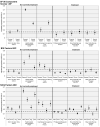Physical, mental, and neurocognitive status and employment outcomes in the childhood cancer survivor study cohort
- PMID: 21844244
- PMCID: PMC3266056
- DOI: 10.1158/1055-9965.EPI-11-0239
Physical, mental, and neurocognitive status and employment outcomes in the childhood cancer survivor study cohort
Abstract
Introduction: We examined the relationship of physical, mental, and neurocognitive function with employment and occupational status in the Childhood Cancer Survivor Study.
Methods: We included survivors 25 years or older with available short form-36 (physical and mental health component scores), brief symptom inventory (depression, anxiety, and somatization), and neurocognitive questionnaire (task efficiency, emotional regulation, organization, and memory). We generated relative risks (RR) from generalized linear models for these measures on unemployment (n = 5,386) and occupation (n = 3,763) outcomes adjusted for demographic and cancer-related factors and generated sex-stratified models.
Results: Poor physical health was associated with an almost eightfold higher risk of health-related unemployment (P < 0.001) compared to survivors with normal physical health. Male survivors with somatization and memory problems were approximately 50% (P < 0.05 for both) more likely to report this outcome, whereas task efficiency limitations were significant for both sexes (males: RR = 2.43, P < 0.001; females: RR = 2.28, P < 0.001). Employed female survivors with task efficiency, emotional regulation, and memory limitations were 13% to 20% (P < 0.05 for all) less likely to work in professional or managerial occupations than unaffected females.
Conclusions: Physical problems may cause much of the health-related unemployment among childhood cancer survivors. Whereas both male and female survivors with neurocognitive deficits--primarily in task efficiencies--are at risk for unemployment, employed female survivors with neurocognitive deficits may face poor occupational outcomes more often than males.
Impact: Childhood cancer survivors are at risk for poor employment outcomes. Screening and intervention for physical, mental, and neurocognitive limitations could improve employment outcomes for this population.
Figures

References
-
- de Boer AG, Verbeek JH, van Dijk FJ. Adult survivors of childhood cancer and unemployment: A metaanalysis. Cancer. 2006;107(1):1–11. - PubMed
-
- Schultz KA, Ness KK, Whitton J, Recklitis C, Zebrack B, Robison LL, et al. Behavioral and social outcomes in adolescent survivors of childhood cancer: a report from the childhood cancer survivor study. J Clin Oncol. 2007;25(24):3649–56. - PubMed
Publication types
MeSH terms
Grants and funding
LinkOut - more resources
Full Text Sources
Medical

